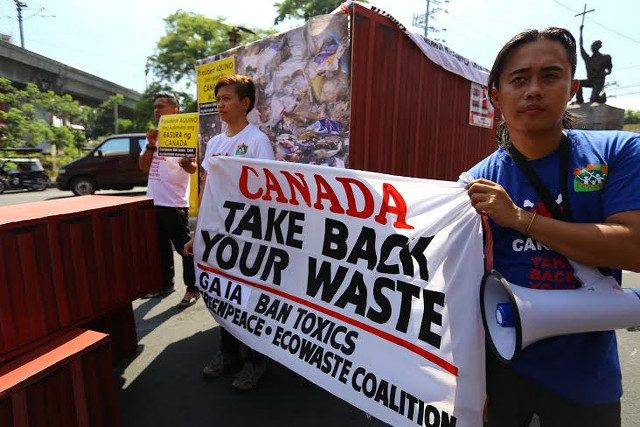SUMMARY
This is AI generated summarization, which may have errors. For context, always refer to the full article.

MANILA, Philippines (UPDATED) – On his May 7-9 state visit to Canada, Philippine President Benigno Aquino III should bring up the issue of 50 Canadian container vans full of garbage that have been stranded in Manila ports for two years.
This was the demand made by environment and labor groups on Monday, May 4, days before Aquino meets with Canadian Prime Minister Stephen Harper.
“Mr. President, we urge you to stand up to the Canadians and ask Prime Minister Harper to take back their illegal waste shipment. Do this not simply because it is the right and legal thing to do, but do so to defend the dignity of the Filipinos,” said BAN Toxics executive director Richard Gutierrez.
Green groups like BAN Toxics and EcoWaste Coalition have called Canada’s approach to the stranded garbage “a blatant case of environmental injustice.” They took to Mendiola in Manila on Monday to remind Aquino of the issue.
Canada’s latest statement quoted the Philippine Department of Environment and Natural Resources (DENR) declaring the trash inside the container vans as neither toxic or hazardous.
Canadian Ambassador Neil Reeder has explained his government’s wish for the garbage to be processed in the Philippines.
But green groups say such a course of action would set a terrible precedent that may encourage more countries to send their garbage to the Philippines. (READ: Leaking shipment of Canadian garbage poses health risks)
Green groups also question the DENR study, maintaining that more comprehensive analysis of the garbage must be done before claiming the garbage may be safely processed on Philippine soil.
The groups say Philippine officials are skirting the issue for fear of endangering diplomatic ties with the much larger, more powerful nation.
“There is nothing diplomatic in dumping waste to another nation and still expect a friendly stance from them,” said Greenpeace Philippines toxics campaigner Abigail Aguilar.
Whether or not Aquino will bring up the issue will be determined by the recommendation of the Department of Foreign Affairs, said Palace Communications Secretary Herminio Coloma Jr during a Monday press briefing.
“The recommendation of the Department of Foreign Affairs will be the basis of how we will relay our position regarding this matter,” he said in Filipino.
The container vans, which came in batches since June 2013, are suspected of all containing garbage. The 18 opened so far were hiding non-recyclable plastics, household waste, and used adult diapers.
Who is responsible?
If the garbage proves to be toxic, Canada would be violating the Basel Convention on the Control of Transboundary Movements of Hazardous Wastes.
The treaty demands that the country responsible for the importation of toxic waste should return the waste to its port of origin within 30 days of being informed of the importation.
But the Philippine interagency committee in charge of the Canadian waste said contacting the Basel Convention Secretariat would be its last resort.
The committee – composed of DENR, Department of Foreign Affairs, and Bureau of Customs – is considering Canada’s suggestion of treating the garbage in Philippines.
But Environment Secretary Ramon Paje said that if this option is pursued, all treatment costs would be shouldered by the Canadian government.
Meanwhile, BAN Toxics has taken matters into their own hands. Gutierrez, aims to bring up the issue to the Basel Convention Secretariat during the Basel Conference of Parties being held from May 4 to 14 in Geneva, Switzerland.
Green groups believe that, with enough pressure, Canada will be compelled to take back its garbage.
A similar case in 2001 led the Japanese government to pay for the return of container vans full of domestic and hospital waste which a Japanese exporter had shipped to the Philippines.
This was after heavy pressure from media and letters from the DFA and DENR.
Costly garbage
The Philippine government is currently shouldering the costs of the stranded container vans.
The space they have been occupying in Manila ports translates to a loss of P144,000 ($3,200) a day.
The Department of Health says it will cost P900,000 to disinfect all container vans – an urgent need after smelly liquids were seen leaking out of some of the vans.
In total, the container vans have cost the Philippine government P87 million ($2 million), estimate green groups.
The Philippines has already filed a case against the Philippine-based importer Chronic Plastics for the illegal shipment.
Canada, meanwhile, maintained that it has “no domestic or international authority” to order Canadian exporter Chronic Incorporated to pay for the return of the container vans.
An online petition asking Prime Minister Harper to take back the Canadian waste has garnered more than 25,000 signatures from countries all over the world, including Canada. – Rappler.com
Add a comment
How does this make you feel?
There are no comments yet. Add your comment to start the conversation.